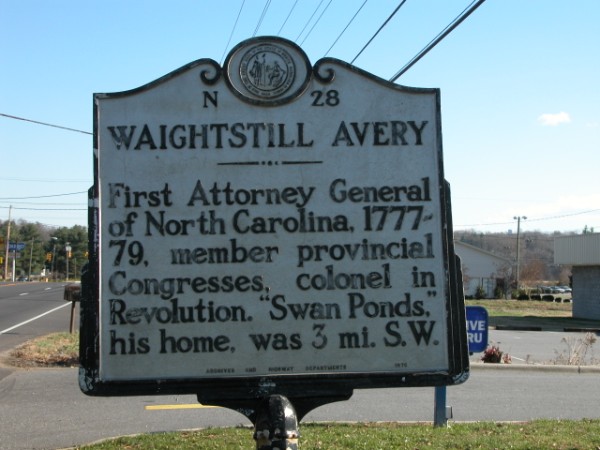Waightstill Avery Historical Marker

In 1766 at the age of 25 Waightstill graduated from Princeton with honors and delivered a Latin salutatory. After this he studied law in Maryland and for a short time practiced in that state. About 1770 he came to North Carolina, lived in Salisbury about a year, then settled in Charlotte where he practiced law in the courtrooms of Mecklenburg, Rowan, Tryon and Anson.
Before and during the Revolution, he was connected with most of the conventions held in North Carolina. He was one of the group which wrote the Mecklenburg Declaration of Independence; of the Hillsboro Congress which formed a plan of government for the state; a member of the Halifax Convention of 1776 when it instructed its delegates to the Continental Congress to vote for independence; also a delegate from Mecklenburg county to the convention which drafted the Sate Constitution of 1776. He was appointed the first attorney general of North Carolina under the new constitution.
In 1778 when Andrew Jackson was young, Col. Avery an avowed Presbyterian and a Puritan , accepted a challenge to fight a duel. This was in accordance with the ethics of the times. In a criminal case before the court of Jonesboro, Avery had been severe in his comments upon some of the legal positions taken by Jackson. Jackson wrote a challenge and gave it to his critic. The combatants met and a shot fired from each pistol well above the heads of the respective adversaries settled the matter and put everyone in a jocular mood. The two men left the ground very good friends.
The duties of Avery's office took him much after this, to escape the wretchedness of malaria, he acquired a large tract of land in the valley of the Catawba River from "Hunting John" McDowell in Burke County. Here he established his home which he called Swan Ponds. His three children, one boy and two girls, were born here.
He resumed the private practice of law and began to travel the western circuit. He represented Burke County in the lower house of the Legislature five times and was in the Senate during the term of 1796.
Col. Avery became an early member of Quaker Meadows Presbyterian Church. In 1783 he was instrumental in obtaining a charter for Morgan Academy, the first institution fro formal education in Burke County. In 1784 he was appointed to commission to select a site and acquire land for the purpose of constructing a courthouse in Burke County.
He continued the practice of law until 1801 when he was thrown from his horse, injuring his right leg so severely that he was never again able to walk, though he often served as a judge of the county court.
The later years of his life were spent at Swan Ponds with his wife, Leah, who survived him eleven years. He died in the judges' chambers at the courthouse in Morganton September 30, 1819 and was buried in the family graveyard at Swan Ponds.
Taken in part from "The Heritage of Burke County," 1981, The Burke County Historical Society, as written in part by Louise Avery Bost. Sources: Elroy McKendree Avery and Catharine Hitchcock (Tilden) Avery, The Groton Avery Clan, vol. 1 (1912) and Edward W. Phifer, Jr. "Saga of a Burke County Family," North Carolina Historical Review, 39 (1962).
The Waightstill Avery historic marker is located on Highway 181 west out of Morganton in front of Burger King.
Back to Burke County Historical Markers Page